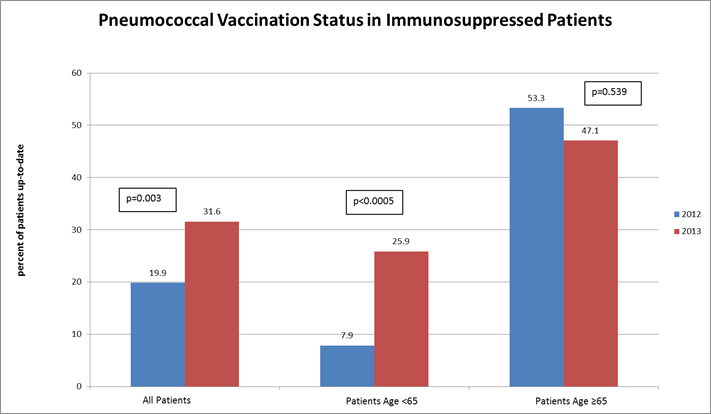Session Information
Session Type: Abstract Submissions (ACR)
Background/Purpose
Patients with autoimmune diseases are at increased risk of complicated infections, and immunomodulating treatment regimens further enhance this risk. Many of these infections, including influenza, invasive pneumococcal disease, herpes zoster, and human papillomavirus, are vaccine preventable. The Centers for Disease Control (CDC), American College of Rheumatology (ACR) and the European League Against Rheumatism (EULAR) recommend pneumococcal vaccination for patients who are immunosuppressed. Despite these clear recommendations, studies have shown pneumococcal vaccination rates ranging from only 19-54% in immunosuppressed populations. The aim of this study was to evaluate the effect of an educational intervention and distribution of a pocket vaccination guide on pneumococcal vaccination rates in an academic rheumatology practice.
Methods
Six attending rheumatologists in an academic setting were selected to receive the intervention in the form of an oral PowerPoint presentation and a pocket-sized guide containing CDC guidelines for vaccination, ACR recommendations regarding the use of vaccines in patients with rheumatoid arthritis, and the most recent recommendations for the pneumococcal vaccine including indications for the pneumococcal conjugate vaccine (PCV13). The rates of immunosuppressed patients being up-to-date with pneumococcal vaccination were assessed pre- and post-intervention over a one month time period (August 2012 and August 2013). Up-to-date vaccination status was defined as any one vaccine dose over age 65, any one dose in the last 5 years, or any 2 prior doses 5 years apart. Only patients age 18 and older on immunosuppressive therapy who were being seen on a follow up basis were included. Patients receiving rituximab were excluded as it is thought to decrease vaccine efficacy. Chi-square test and logistic regression were used to analyze the data (STATA 11.0).
Results
Among all providers, 171 immunosuppressed patients were seen in the pre-intervention time period and 190 in the post-intervention time period. 19.9% of eligible immunosuppressed patients were up-to-date with their pneumococcal vaccination pre-intervention as compared to 31.6% post-intervention (p=0.003) with an odds ratio of 1.85 (95% CI 1.11-3.01)[Table 1]. This increase remained significant when adjusting for site of clinic and provider. Among patients less than 65 years old, up-to-date vaccination status increased from 7.9% pre-intervention to 25.9% post-intervention (p<0.0005). Vaccination practices varied widely among providers.
Conclusion
A QI strategy involving an educational session along with distribution of a pocket-sized vaccination guide significantly increased the rate of being up-to-date with pneumococcal vaccination among immunosuppressed patients in our academic rheumatology practice.
Disclosure:
M. Bussey,
None;
R. A. Ostrowski,
None.
« Back to 2014 ACR/ARHP Annual Meeting
ACR Meeting Abstracts - https://acrabstracts.org/abstract/a-quality-improvement-initiative-to-improve-pneumococcal-vaccination-rates-in-immunosuppressed-patients/

